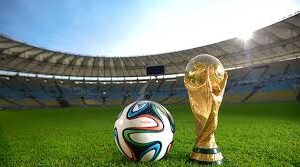Explore the history of the Golden Boot in the World Cup. From legends to surprises, discover how football’s top scorers shaped the tournament.
The History of the Golden Boot: World Cup’s Top Scorers Through Time
The FIFA World Cup is the pinnacle of football, where legends are made and unforgettable stories unfold. Among the most prestigious individual honors is the Golden Boot, awarded to the tournament’s top scorer. Over the decades, the Golden Boot has celebrated the players who delivered when it mattered most—those who found the back of the net with consistency, brilliance, and instinct.
This MB8 article dives into the complete history of the Golden Boot, the players who earned it, and how it continues to influence careers, narratives, and football leagues around the world.
What Is the Golden Boot?
The Golden Boot, formerly known as the Golden Shoe, is awarded to the player who scores the most goals in a World Cup tournament. First officially introduced in 1982, it has retroactively been applied to earlier World Cups, allowing fans to track the top scorers from 1930 onwards.
If two or more players are tied with the same number of goals, assists and minutes played are used as tiebreakers. This ensures the award goes to not just the top scorer, but the most efficient and impactful attacker.
Retroactive Golden Boot Winners (1930–1978)
Although the Golden Boot became official in 1982, FIFA recognized top scorers from earlier tournaments:
-
1930 (Uruguay) – Guillermo Stábile (Argentina) – 8 goals
-
1934 (Italy) – Oldřich Nejedlý (Czechoslovakia) – 5 goals
-
1938 (France) – Leônidas da Silva (Brazil) – 7 goals
-
1950 (Brazil) – Ademir (Brazil) – 8 goals
-
1954 (Switzerland) – Sándor Kocsis (Hungary) – 11 goals
-
1958 (Sweden) – Just Fontaine (France) – 13 goals (still a record for a single tournament)
-
1962 (Chile) – Six players tied with 4 goals
-
1966 (England) – Eusébio (Portugal) – 9 goals
-
1970 (Mexico) – Gerd Müller (West Germany) – 10 goals
-
1974 (West Germany) – Grzegorz Lato (Poland) – 7 goals
-
1978 (Argentina) – Mario Kempes (Argentina) – 6 goals
Iconic Golden Boot Winners (1982–Present)
Let’s take a look at some of the most iconic and impactful Golden Boot winners in the modern era:
1982 – Paolo Rossi (Italy)
After returning from a ban, Rossi led Italy to glory with 6 goals, including a memorable hat-trick against Brazil. His performances helped Italy lift the trophy and sparked a legendary career revival.
1994 – Hristo Stoichkov & Oleg Salenko (6 goals each)
Salenko remains the only player to score five goals in a single World Cup match (vs. Cameroon), while Stoichkov led Bulgaria to a stunning semi-final run.
1998 – Davor Šuker (Croatia)
Šuker’s 6 goals were crucial in Croatia’s first World Cup appearance, leading them to third place and putting Croatian football on the global map.
2002 – Ronaldo (Brazil)
After years of injuries and heartbreak in 1998, Ronaldo returned with 8 goals to win Brazil its fifth title. His story is a symbol of redemption.
2014 – James Rodríguez (Colombia)
James’s 6 goals were a revelation, including a spectacular volley against Uruguay. It earned him a move to Real Madrid and elevated Colombia’s reputation.
2018 – Harry Kane (England)
Kane’s 6 goals helped England reach the semi-finals. Though some came from penalties, he proved to be a reliable finisher and leader on the world stage.
Golden Boot Winners and Their Impact on Football Leagues
Winning the Golden Boot is often a career-defining achievement. For many players, it leads to lucrative transfers, endorsement deals, and elevated status in their domestic leagues.
-
James Rodríguez moved from AS Monaco to Real Madrid after his 2014 breakout.
-
Davor Šuker became a legend at Real Madrid and Arsenal after his 1998 feat.
-
Ronaldo already had a stellar club career, but 2002 reinforced his place among the greatest.
-
Harry Kane’s performance in 2018 cemented his reputation as the Premier League’s elite striker.
This illustrates how World Cup excellence translates into opportunities across top leagues worldwide. Performances on this global stage are scrutinized by scouts, clubs, and fans alike, influencing transfer markets and club strategies.
Evolution of Scoring Trends
In early tournaments, goal fests were common due to open play styles. However, modern football has become more tactical, with fewer goals per match. This makes winning the Golden Boot even harder in today’s game.
From Just Fontaine’s 13 goals in 1958 to Kane’s 6 in 2018, we see how defensive solidity has challenged strikers, making each goal more precious and impactful.
Who Might Win the Golden Boot in 2026?
Looking ahead to the 2026 World Cup in the USA, Canada, and Mexico, several rising stars and established goal machines are poised to challenge for the Golden Boot:
-
Kylian Mbappé – After leading France’s attack in 2018 and 2022, he’s a top contender.
-
Erling Haaland – If Norway qualifies, his raw power and finishing could be unstoppable.
-
Lautaro Martínez – With Argentina’s post-Messi era taking shape, Lautaro might lead the charge.
-
Vinícius Júnior – Brazil’s rising star is set to shine on North American soil.
With an expanded format and more teams, there will be more matches—potentially giving strikers more chances to rack up goals.
The Golden Boot and Its Legacy
Beyond stats and trophies, the Golden Boot represents moments of brilliance, pressure-handling, and clinical execution. It captures the essence of football’s attacking artistry.
Players like Müller, Ronaldo, Kane, and Fontaine aren’t just remembered for goals—they’re remembered for defining eras and inspiring generations.
The Golden Boot is more than just a golden shoe; it’s a golden story—etched into football history.
Conclusion: Celebrating Greatness Across Every League
The Golden Boot will always be a symbol of excellence in world football, bridging the World Cup to the global league ecosystem. The players who win it don’t just earn personal glory—they shape football’s future.
As we approach World Cup 2026, fans across every league should keep an eye on the next Golden Boot winner. Their performance could inspire your local club’s next transfer, your national team’s next generation, or your favorite player’s career leap.
Support the future of football by following every twist and turn—from the World Cup to your favorite league.



